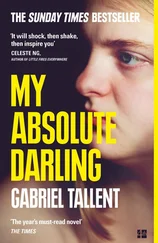As Esme alternated between flirtation and sullenness, he tried for kindness. This wasn’t all her fault: he was helplessly responsive to vulnerability, and — he could admit it — he did have a tendency to rush in and try to fix whatever was wrong. Therefore he imitated Daisy’s forbearance when Esme couldn’t get even simple things right, like using hypoallergenic detergent instead of the regular kind that caused the baby to break out in a rash. The tender verbal scat of any mother cradling her baby was a language Esme didn’t speak. Her hold was so tentative the baby went round-eyed and chafed his head this way and that, wondering who would come to his aid. More than once Esme neglected to pick up dangerous buttons or coins from the floor. She had to be reminded to burp him after nursing and then, chastened, would sling him across her shoulder like a sack of rice. Could you even say she loved the baby? Breastfeeding might account for Esme’s sleepy-eyed bedragglement and air of waiting for real life to begin, but, Daisy said, there was absolutely no justifying the girl’s self-pity. Consider where she, Daisy, had come from: worse than anything this girl had gone through, but had Sean ever seen her spend whole days feeling sorry for herself, lying in dirty sheets reading wedding magazines, scarcely managing to crawl from bed when the baby cried? It wasn’t as if she had no support. Victor was right there. Who would have believed it? He was attentive to Esme, touchingly proud of his son, and even after a long day at the mill would stay up walking the length of the downstairs hallway with the colicky child so Esme could sleep. For the first time Victor was as good as his word, and could be counted on to deal uncomplainingly with errands and show up when he’d said he would. Victor’s changed ways should have mattered more to Esme, given the desolation of her childhood. Victor was good to her .
Esme could not explain what was wrong or what she wanted, Daisy said after one conversation. She was always trying to talk to the girl, who was growing more and more restless. They could all see that, but not what was coming, because it was the kind of thing you didn’t want to believe could happen in your family: Esme disappeared. Dylan was almost four, and for whatever reason she had concluded that four was old enough to get by without a mother. That much they learned from her note but the rest they had to find out. She had hitchhiked to the used-car dealership on the south end of town and picked out a white Subaru station wagon; Wynn Handley, the salesman, said she negotiated pleasantly and as if she knew what she was doing and (somewhat to Wynn’s surprise, you could tell) ended up with a good deal. Esme paid in cash, not that unusual in a county famed for its marijuana. She left alone — that is, there was no other man. None that Wynn had seen, at least. The cash was impossible to explain, since after checking online Victor reported that their joint account hadn’t been touched, and they hadn’t saved nearly that much anyway. Esme had no credit card, of course, making it difficult to trace her. Discussion of whether they were in any way to blame, and where Esme could have gone, and whether she was likely to call and want to talk to her son, and whether, if she called, there was any chance of convincing her to come back, was carried on in hushed voices, because no matter what she’d done the boy should not have to hear bad things about his mother.
With Esme gone, Victor began to talk about quitting the mill. The ceaseless roar was giving him tinnitus; his back hurt; some nights he fell asleep without showering and woke already exhausted, doomed to another day just like the last, and how was he supposed to have any energy left for the kid? Had Esme thought of that before she left, he wondered — that he might not be able to keep it together? No doubt his steadiness had misled her into thinking it was safe to leave, and when he remembered how reliable and fond and funny and tolerant he had been, anger slanted murderously through his body; and it was like anger practiced on him, got better and better at leaving him with shaking hands and a dilated sense of hatred with no nearby object; and he began to be very, very careful not to be alone with his little boy.
Dylan understood this. After nightmares he did not try his dad’s room, right next to his, but patted his way through the dark house up the narrow flight of stairs to the bedroom where he slid in between Sean and Daisy. More than once his chilly bare feet made accidental contact with Sean’s genitals, and Sean had to capture the feet and guide them away. This left him irritably awake, needing to make the long trip to the bathroom downstairs, and when he returned the boy was still restless and Sean watched him wind a hand into Daisy’s long hair and rub it against his cheek until he could sleep. Worse than jealousy was the affront to Sean’s self-regard in entertaining so contemptible an emotion. This was a scared little boy, this was his tight hold on safety, this was his grandfather standing by the side of the bed looking meanly down. Protectiveness toward his own flesh and blood had always been Sean’s ruling principle, and if that went wrong he didn’t know who he was anymore. He rose to dress for work one cold six A.M. and noticed the tattoos running cruelly down the boy’s arm. Had an older kid got hold of him somehow, was this some kind of weird abuse, why hadn’t he come running to his grandfather? Sean bent close to decipher the trail of descending letters. I LOVE YOU. Not another kid, then. Not abuse. But wasn’t Daisy aware a boy could be embarrassed by that, wouldn’t the ink’s toxins be absorbed through his skin, didn’t she understand that was going too far, inscribing her love on the boy while he did what — held his arm out bravely? Time, past time, for Sean to try to talk to Daisy, to suggest that daycare would be a good idea, or a playgroup where the boy could meet other kids. When Daisy was tired or wanted time to herself she left the boy alone with the remote, and once Sean walked in on the boy sitting cross-legged while on the screen a serial killer wrapped body parts in plastic, and how could you talk to a child after that, what could you tell him to explain that away? All right, they could do better. He supposed most people could do better by their kids. Maybe her judgment in taking a pen to the boy’s arm wasn’t great, but if that was the worst thing to befall him, he’d be fine. If Daisy adored this boy, Sean could live with that. More than live with it: he admired it. He admired her for being willing to begin again when she knew how it could end.
Maybe Victor’s mood would have benefited from confrontation — a kitchen-table sit-down where, with cups of reheated coffee to warm their hands, father and son could try to get at the root of the problem — but envisioning his own well-meaning heavyheartedness, and guessing that Victor would take offense, Sean was inclined to ignore his son’s depression. In most cases, within a family, there was wisdom in holding one’s tongue. Except for one thing: Victor could, if he concluded his chances were better elsewhere, take the boy with him when he left. This gave a precarious tilt to their household, an instability whose source, at bottom, was Victor’s fondness for appearing wronged. He came home with elaborate tales of affronts he had suffered, but Sean knew the foreman and doubted that Victor had been shown any unfairness. When Victor needed to vent Sean steered clear and Daisy, rather than voicing her true opinion — that it was time he got over Esme — calmly heard him out. Victor could ruin his mother’s peace of mind by ranting at the unbelievable fucking hopelessness of this dead-end town, voice so peeved and fanatical in its recounting of injustice that Sean, frowning across the dinner table, thought he must know how crazy he sounded, but Victor kept on: he was only waiting for the day when the mill closed down for good and he could pack up his kid and his shit and get out. What were they, blind? Couldn’t they see he had no life? Did they think he could stand this another fucking day? From his chair near his dad Dylan said, “Are we going away?” “No, baby boy, you’re not going anywhere,” said Sean, at which Victor did the unthinkable, pulling out the gun tucked into the back of his jeans and setting it with a chime on his dinner plate and saying, “Then maybe this is what I should eat.” Daisy said, “Sean,” wanting him to do something, but before he could Victor pushed the plate across the table to him and said, “No, no, no, all right, I’m sorry, that was in front of the kid, that’s taking it too far, I know I know I know, don’t ask me if I meant it because you know I don’t, but I swear to god, Dad, some days it crosses my mind. But I won’t. I never will.” Gently he cupped his boy’s head. “I’m sorry to have scared you, Dyl. Daddy got carried away.”
Читать дальше












